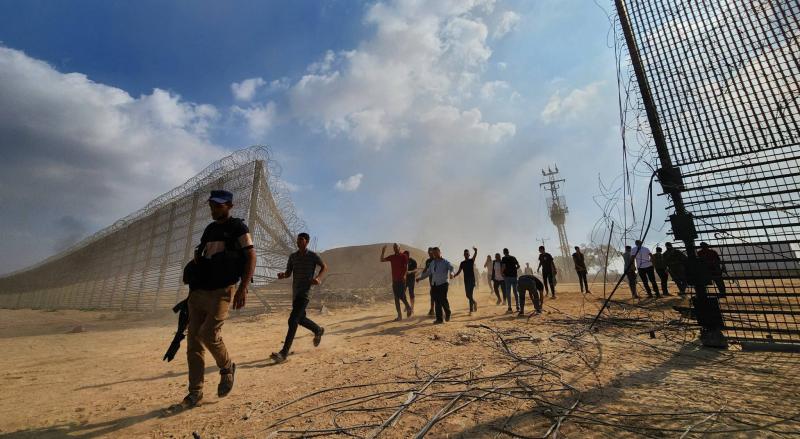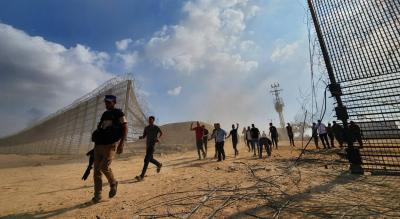The world woke up on October 7th last month to a loud explosion when an armed Palestinian group stormed the territory of the State of Israel, established in 1948. The Israeli response was an air assault on Gaza, employing the military term "fire blanket," which means covering an entire area with fire, killing, and comprehensive destruction—an annihilating violent retaliation against both people and property. The world held its breath, and questions crowded into the mouths of politicians and analysts. What would be the limits of the Israeli war on the people of Gaza and the West Bank? When would the Israeli army achieve the goals stated by Israeli Prime Minister Benjamin Netanyahu: the complete eradication of Hamas, the recovery of Israelis held captive by the group, and complete control over the Gaza Strip?
Israelis and their Western allies believed that these objectives could be accomplished in just a few days. The United States and several European countries mobilized their air and naval forces in the region under the banner of defending Israel's security, which had been threatened to such an extent since its founding. The fire blanket continued, and ground forces surged, killing and destroying, but Palestinian resistance did not weaken or break. A wide anger surged among millions of Israelis demanding the release of their relatives held by the Palestinian resistance in Gaza, while the world's conscience and reason became engrossed in the thousands of civilian Palestinian casualties. A flood of political initiatives emerged through international organizations and regional groups, showcasing images of ethnic cleansing, insane killings, and the suffering of innocents due to displacement, destruction, and starvation. The human flood supporting the Palestinian cause erupted around the globe.
Student protests erupted across many American and European universities, and streets filled in countries around the world in solidarity with the Palestinian people and condemnation of Israeli aggression. The UN General Assembly convened a session to decide on recognizing the Palestinian state, which resulted in its recognition. International political and legal stances followed. The International Court of Justice ruled that what Israel is doing in Gaza constitutes genocide against the Palestinian people, followed by the prosecutor of the International Criminal Court demanding the criminal prosecution of the Israeli Prime Minister and his Defense Minister. The supportive human flood for the Palestinian cause created a political stream alongside the legal one. Recognition of a Palestinian state has risen in the heart of Western Europe, Israel's historical ally.
The United States, embroiled in the tumult of a presidential election, finds its elderly Democratic president Joe Biden in a dark confession room. He has become addicted to proclaiming his Zionism, despite not being Jewish, and initiated sending arms and money to his beloved Israel. He swings between the blows of the human flood both in popular and political-legal terms, while the Israeli massacres in Gaza have become a burning burden on his back, viewed through the lens of voting boxes in the upcoming presidential election, with his political rival Donald Trump continuously landing punches on him, despite the many legal cases pursuing Trump in American courts. The U.S. government continues its efforts with mediating countries to create initiatives to alleviate the suffering of the people of Gaza, provide food and medical aid, and reach a ceasefire in the war on Gaza. Europe is continuously moving towards recognizing a Palestinian state, with EU leaders working toward consensus on that.
Netanyahu, who sees no way to escape legal prosecution domestically except through further extremism and aggression, and refuses all international efforts to recognize the Palestinian state, is falling into a pit of global legal pursuit, as anger rises domestically demanding his resignation. The overwhelming human flood around the world has reopened old historical records. Anti-Semitism, an old scarecrow often raised by Israeli leaders against anyone defending Palestinian rights and condemning Israeli aggression, has lost its political and moral influence. New generations around the world are largely unaware of these terms as they see and hear daily about the horrific massacres that Israel is committing in Gaza and the West Bank against unarmed Palestinian civilians, as well as the armed Israeli settlers seizing Palestinian homes and farms.
The great Italian thinker, Professor Alessandro Barbero, has been lecturing at various Italian universities recently, causing a major stir in Italian media when he presented historical scientific studies. He stated that anti-Semitism had no place in the Islamic world throughout history, noting that Jews lived in Andalusia and North Africa respectfully and were expelled along with Muslims after the fall of Andalusia. Barbero added that anti-Semitism was a European phenomenon and that the establishment of the State of Israel aimed to rid Europe of a problem born and sustained there. He stated that the Jews currently living in Israel are of European descent and have no historical connection to Palestine. What the world is witnessing in Gaza has prompted many scholars, politicians, and thinkers to reopen the files on the roots of the Palestinian issue. Israel does not possess a weapon capable of bombing the global human flood.




